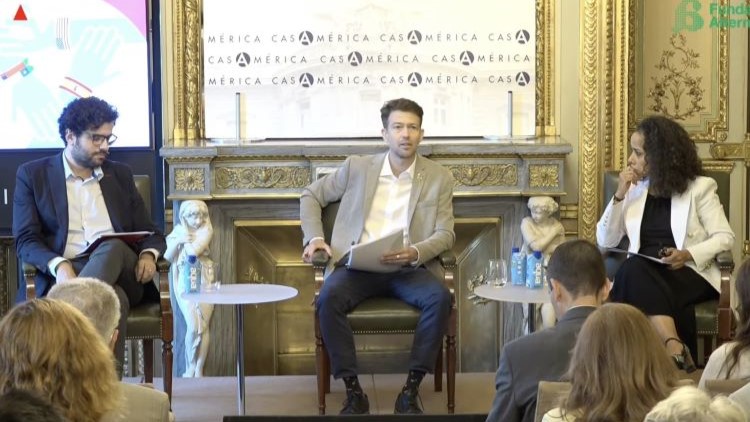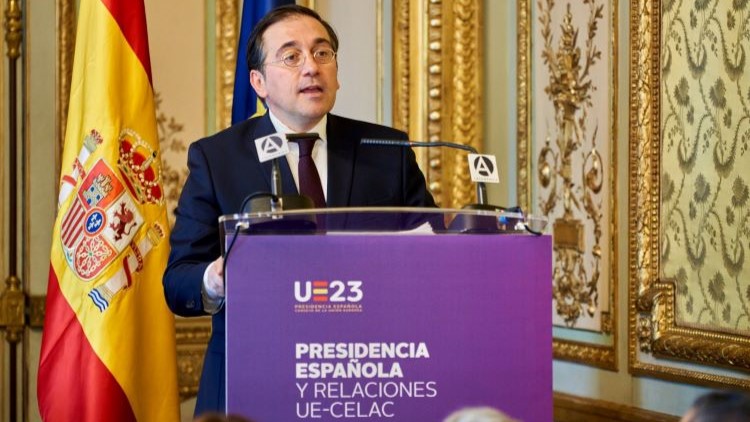Eduardo González
United States Ambassador to Spain, Julissa Reynoso, assured yesterday that her country maintains a “continuous” dialogue with Latin American countries and invited Spain to get more directly involved in this approach because both countries maintain “extremely important synergies” with the region, both in terms of human rights as well as historical, family or business matters.
“The Latin American and Caribbean region is closely connected with Spain and the United States, geographically, historically, culturally and as a place for investment,” said the ambassador during her participation in the seminar Promoting Democracy and Human Rights Together: Spain-US-Latin America, organized by the Alternativas Foundation, Casa de America and the US Embassy in the framework of the upcoming start of the Spanish Presidency of the European Union.
According to the ambassador, “for the US, Latin America is an external as well as a domestic issue”, since “22% of the population descends from or has to do, in one way or another, with Latin America”. Besides, “the first investor in the region is not China, not at all, it is the US”, and the remittances that these Latin American groups send to their families “represent between 20 and 25% of the economy of their countries”, added Reynoso, herself born in the Dominican Republic.
In these circumstances, she assured, “the US has no problem with CELAC (Community of Latin American and Caribbean States), it has disagreements with certain CELAC member countries, but as an institution, the relationship is chévere” (Caribbean expression for “excellent”). “The US continuously maintains dialogue with the countries of the region, individually or via the OAS, and so does Spain”, and, therefore, Washington would like that, “in these meetings with the region, Spain joins as a guest, as an observer or as a non-member participant, whatever you want to call it”, she assured. In fact, she recalled, “Spain is doing the same with the US, integrating it into events”, such as the Ibero-American Summit in the Dominican Republic, “in which the US is not a member but sent Senator Christopher Dodd, Joseph Biden’s special envoy for Latin America”.
“The synergies are extremely important and it’s not just symbolic, we have many interests in common, from the promotion of human rights to how to ensure that businesses in the region are competitive and are welcomed with secure contracts,” she continued. “We also have very powerful historical and family ties, both the U.S. and Spain, with Latin America,” she added. “The United States and Spain are working together to support a better future for the region. We can be allies in this struggle with hope and commitment to the Latin American and Caribbean region,” she said.
The ambassador also assured that democratic governance has become “a central commitment of the Biden-Harris Administration,” and warned, therefore, of the “threats” to democracy in Latin America and the Caribbean, such as corruption (which “discourages investment and undermines citizens’ trust in governments”), insecurity (“the most violent region in the world”), inequality (both gender inequality and “systematic racism in my country and throughout the Americas”) and authoritarianism, which “is being fought by demanding the release of hundreds of political prisoners” in “Nicaragua, Cuba, Venezuela and other countries”.
Antón Leis
At the same event – which was moderated by Vicente Palacio, director of Foreign Policy at the Alternativas Foundation – the director of the Spanish Agency for International Development Cooperation (AECID), Antón Leis, praised the current US Administration for having placed the defense of democracy “on the multilateral agenda, where it was not before”, but warned that “the health of democracies is not at its best all over the world”.
In the case of Latin America, he said, there is “the perception that democracy does not work for the people.” “Fifty-one percent of the population would accept a non-democratic regime if it gives results to those problems and indifference towards democracy has gone, in two years, from 16 to 27 percent,” he continued. “Electoral systems are often called into question” and there is strong “online disinformation about the Ukrainian war,” he warned. “Russia Today is the most followed of the international websites,” he lamented.
In this context, he assured, the function of Spanish Cooperation is “to help debate to build fairer and more democratic societies”, talking with its “natural allies, with the US and with Latin American countries, with which we share many things, including the commitment to democracy and human rights”. “It is not so much a matter of transferring resources as of supporting inclusive processes of dialogue, working in cooperation programs with civil society”, because “democracy is not only made by governments, it is not only voting”, he warned.
Leis also warned of the relevance of Latin America in the current international context. “In this complex world we need friends, and Latin America can be that friend,” he said. “The European bloc has taken Latin America out of its way for too long,” but, in the current context, “the U.S. and Spain can help in this fit,” creating “a very important Spain-Latin America-US triangle, with three poles of the triangle that share many values and interests.






